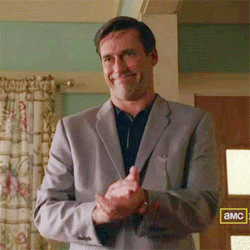I don't know if I was the only one who was a bit queased-out by the final episode of Mad Men last night. My lack of excitement before I even saw it was telling, and all the way through it I was poised for "it-was-all-a-dream" syndrome, something hopelessly hokey to just kill the whole thing.
In a way, it happened. (This is full of spoilers, so if it's on your DVR and you haven't seen it yet, well, just keep on reading!) I noted an uncharacteristic compulsion to neatly-if-artificially tie up loose ends, and, especially, pair off those nice deserving kids with the right partners (while paring down other, less-workable connections). The show got heavily into the EST-y, Esalin-ish movements of the early '70s, with Don, the least likely candidate, being most deeply-involved.
Though they didn't show Betty lying with waxen beauty in her coffin with a lily in her hand (and her husband, ol' Whatsisname, anxiously shaking hands up and down the aisle of the church wondering if his wife's corpse was pretty enough to win him the Governorship - sorry, I can't forgive him for that VERY BAD crying scene last week), they did show her smoking as she gently expired from lung cancer. How ironic: it's Betty who self-destructs, not Don.
Though they didn't show Betty lying with waxen beauty in her coffin with a lily in her hand (and her husband, ol' Whatsisname, anxiously shaking hands up and down the aisle of the church wondering if his wife's corpse was pretty enough to win him the Governorship - sorry, I can't forgive him for that VERY BAD crying scene last week), they did show her smoking as she gently expired from lung cancer. How ironic: it's Betty who self-destructs, not Don.
I won't get into the rest of it because reciting the details lays bare just how soap-operatic the show had become. How they ended Don - suicidal one minute, compassionate the next, followed by blissfully "ohmmm"-ing on a hilltop - made me literally groan out loud. The topper for all this was a repeat of the "iconic" Coke commercial of 1971, in which an angelic choir of wholesome and well-fed hippies proclaims Coke as "The Real Thing". Irony alert! Irony alert!
The show was all about artifice, wasn't it? Illusion, delusion, hawking products that were just products, things, not some fulfillment of the American Dream. (Remember the carousel? And how about "it's toasted", which essentially means nothing). I don't know if this was intended or not, but three minutes before the ending of the ending, I was saying out loud, "Okay, then. . . " As the old jazz musician once said after playing for 12 hours, "How we gonna end this thing?"
They ended it all right, because they had to. Old Wienerhead finally had his day. (Spelling variation intentional.) I don't know if it was because only one person acted as emperor and Ayatollah, but sometimes the seams showed. The seams represented how much air time a character was allowed in each episode/season. This was contractual, and seemingly non-negotiable. How do I know this? When AMC insisted on adding an extra commercial, a character had to be dropped. This horrified me, but it didn't seem to bother anyone else. And then there were the "hysteric returns": oh Jesus, there's Duck Phillips again! How'd he get in here? He rose from the dead more predictably and annoyingly than Jesus. How did this happen? Why, folks, it was in his contract! Duck Phillips must have had a particularly good agent and worked all this out from the beginning of the series. Sal Romano did not, and was out on his ass just as his character was starting to get interesting.
It's over, it's over, it's over, as Roy Orbison once wailed, and I'm a bit relieved, and also kind of let down. Sort of like getting married, I think. I've never been divorced, so I can't comment on that. At its best, this show kicked ass. I was in love with Don and made little gifs of him (a sure sign of fascination. No Blingees, though. Can I make one now?). I could hardly believe how consistently good it was. When did it all begin to slip sideways? Everyone wants to blame Megan, poor thing, but wasn't it really all her fault? It had something to do with the way she embarrassed Don in front of all his friends with the Zoo-bee-doo-bee-doo thing.
That would kill any show's mojo, don't you think?






